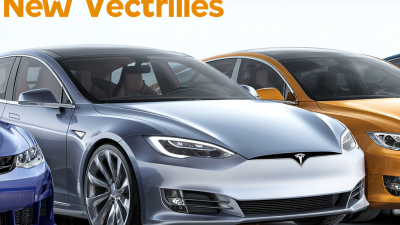Sorry. We did not find anything.
5 Compelling Reasons to Choose Ev Pickup for Your Sustainable Business Solutions
As businesses increasingly prioritize sustainability in their operations, choosing the right vehicles is crucial for reducing carbon footprints and enhancing efficiency. The rise of electric vehicles (EVs), particularly EV pickups, presents a transformative solution for companies aiming to align their logistics with eco-friendly practices. According to a report by the International Energy Agency, electric vehicle sales are projected to exceed 30% of total light-duty vehicle sales by 2030, underscoring a significant shift towards electrification in the transportation sector. Moreover, a study from McKinsey reveals that businesses utilizing electric pickups can reduce their greenhouse gas emissions by up to 60%, while also experiencing lower total cost of ownership compared to traditional gasoline pickups. With these compelling statistics and the pressing need for sustainable initiatives, adopting an EV pickup can not only drive operational success but also reinforce a company’s commitment to a greener future.

Reasons to Embrace Electric Pickup Trucks for Eco-Friendly Operations
As businesses increasingly prioritize sustainability, electric pickup trucks (EV pickups) are emerging as a game-changing solution for eco-friendly operations. These vehicles not only reduce carbon emissions but also offer numerous benefits that align with environmentally conscious practices. By embracing EV pickups, companies can significantly lower their operational footprint while achieving greater efficiency in logistics and transportation.

One of the most compelling reasons to adopt electric pickups is the cost-effectiveness of electric power over traditional fuels. With rising fuel prices, switching to an EV pickup can substantially reduce overall transportation costs. Additionally, many governments offer incentives for electric vehicle purchases, making the transition more financially appealing. Furthermore, EV pickups are equipped with advanced technology that enhances performance and safety, ensuring that businesses can maintain productivity without compromising on ecological responsibilities.
Another crucial factor is the growing consumer demand for sustainable practices. Companies that integrate EV pickups into their operations not only demonstrate their commitment to environmental stewardship but also attract eco-conscious customers. By positioning themselves as leaders in sustainability, businesses can enhance their brand reputation and foster long-term customer loyalty. In a world where eco-friendly choices are becoming a key differentiator, adopting electric pickups is a strategic move toward a more sustainable future.
The Cost Efficiency of Investing in Electric Pickups for Businesses
The cost efficiency of investing in electric pickups for businesses is becoming increasingly attractive as companies search for sustainable solutions. The extension of government discounts for electric vans and trucks means that thousands of businesses will continue to benefit from crucial financial support. This initiative not only reduces the initial purchase cost but also helps in managing operational expenses over time. Electric pickups incur lower fuel and maintenance costs compared to their traditional counterparts, making them a smart choice for any fleet.
Tips for maximizing cost efficiency with electric pickups include taking full advantage of available tax credits, which can provide up to $7,500 in savings. Additionally, businesses should consider integrating charging infrastructure to capitalize on free charging opportunities. The logistics industry is already witnessing a significant shift towards electric and hydrogen-powered trucks, and companies can gain a competitive edge by adopting these innovations early.
Staying informed about industry trends, such as the increasing affordability of electric vehicles projected by major manufacturers, can also be beneficial. As more cost-effective electric pickups become available, companies have the chance to reduce their carbon footprint while ensuring their bottom line remains healthy.
How Electric Pickups Enhance Your Brand's Sustainability Image
Electric pickups are rapidly transforming the landscape of sustainable business solutions, presenting a unique opportunity for brands to enhance their sustainability image. According to a recent report by the International Energy Agency (IEA), electric vehicles (EVs) could represent 30% of total vehicle sales by 2030, further emphasizing the shift toward cleaner transportation. By integrating electric pickups into their fleets, businesses not only reduce their carbon footprint but also align with the growing consumer demand for environmentally responsible practices.
The sustainability image of a brand is increasingly influenced by its operational practices. Research from Deloitte indicates that 55% of consumers are willing to pay more for products from companies that communicate a commitment to environmental sustainability. By choosing electric pickups, businesses can effectively convey their dedication to reducing emissions, positioning themselves favorably in a competitive market. Furthermore, electric pickups typically have lower operational costs and maintenance needs, allowing businesses to reinvest savings into other sustainable initiatives. Adopting electric pickups is not just a trend; it's a strategic move that signals a commitment to a greener future and resonates with eco-conscious consumers.
Electric Pickup Impact on Sustainability Metrics
Exploring the Technological Advantages of Ev Pickups for Business Needs
Electric vehicle (EV) pickups are rapidly emerging as key players in the sustainable business landscape, driven by their technological advantages. With the global rechargeable battery market projected to expand from $871.8 billion in 2024 to $1.355 trillion by 2031, reflecting a compound annual growth rate of 6.50%, businesses integrating EV pickups can benefit from this upward trend. These vehicles are not only environmentally friendly but also leverage advanced technologies for better efficiency, making them ideal for companies looking to enhance their operational sustainability while reducing their carbon footprint.
In a highly competitive automotive market, innovation is crucial. Recent industry analyses indicate that the electric vehicle segment, particularly battery electric vehicles (BEVs), is redefining traditional transportation paradigms. As companies focus on electrification, factors such as range, charging infrastructure adaptability, and battery supply chain dynamics are of utmost importance. The growth of the micro electric vehicle sector, projected to increase from $9.03 billion in 2024 to $22.5 billion by 2032, further underscores the shifting consumer preferences towards electrified solutions. Embracing EV pickups not only aligns businesses with these trends but also positions them as leaders in the transition towards sustainable energy.
The Long-Term Environmental Impact of Switching to Electric Fleet Solutions
Transitioning to electric fleet solutions is no longer just a trend but a fundamental shift towards sustainability for businesses. The global electric mobility market is projected to expand significantly, reaching an estimated $5,089.8 billion by 2024 and soaring to approximately $16,734.6 billion by 2031, reflecting a compound annual growth rate (CAGR) of 18.53% from 2024 to 2031. This surge is driven by increasing environmental regulations and the urgent need to reduce carbon footprints, particularly as commercial vehicles contribute substantially to greenhouse gas emissions.
In addition to the strong market potential for electric vehicles, companies are rapidly adopting different types of electric propulsion. The truck-as-a-service (TaaS) market is expected to jump from $16.03 billion in 2023 to $40.50 billion by 2030, a phenomenal CAGR of 14.2%. This rapid growth indicates that businesses are recognizing the long-term financial and environmental advantages of integrating electric trucks, buses, and vans into their fleets.
Tips: When considering a transition to an electric fleet, evaluate the specific needs of your business to choose the right category of vehicles—be it BEVs or PHEVs—based on power output and range capabilities. Engage with industry reports to stay informed about technological advancements and market trends that can help you make data-driven decisions for sustainable investments.

Related Posts
-

7 Essential Benefits of Choosing Electric Heavy Duty Trucks for Your Business
-

2025 Innovations Shaping the Future of Best Full Electric Cars for Global Buyers
-

Emerging Trends: How Best New Electric Cars Are Shaping the Global Automotive Landscape in 2023
-

Ultimate Showdown of the Best New Electric Vehicles on the Market
-

Championing Excellence in Manufacturing New Ev Cars from China for Global Buyers
-

5 Essential Tips for Choosing the Best New Electric Vehicles
